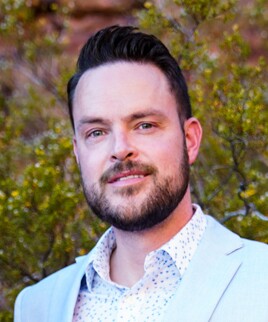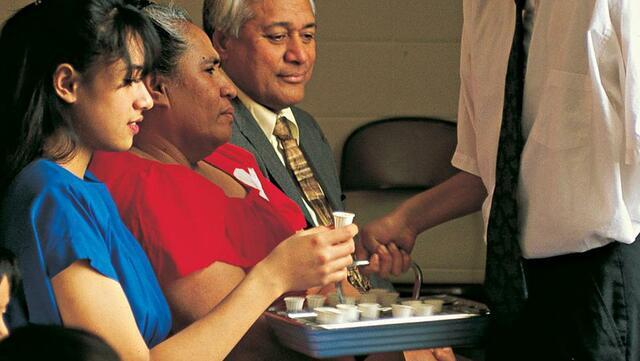Editor’s note: This is not a comprehensive list of what the Church and Church leaders have said about professional mental health services. We invite you to read more at mentalhealth.churchofjesuschrist.org.
The following article discusses the topic of suicide, and reader discretion is advised. We also recognize that individuals struggling with mental health issues may experience suicidality. In many cases, professional diagnosis and help is critical and must be prioritized over faith-based solutions. For those seeking help, the National Suicide Prevention Lifeline can be reached by dialing 988.
The women and men leading the Church today are not naive to the exponential growth in the number of individuals experiencing with mental health challenges around the world. In a 2018 devotional to young married couples, President Dallin H. Oaks spoke about its prevalence in today’s society.
“Scholars reported in 2014 that 1 in 5 of the US population between the ages of 18 to 25 had a mental illness,” he said, as reported by Church News. ”In addition, between 2008 and 2016, there was a 40 percent increase in college students being diagnosed or treated for depression, and a 70 percent increase in diagnosis of or treatment for anxiety. … Truly these are different times for your generation.”
► You may also like: Latter-day Saint psychologist: Why you might still struggle with anxiety (or other mental health issues) despite your best efforts
One of the earliest examples of a Church leader’s suggestion of medical treatment for those experiencing mental health issues came from the late Elder Alexander B. Morrison, an emeritus General Authority Seventy. In a 2006 meeting for the Utah Chapter of the National Alliance on Mental Illness, he said, “Despite the fact that medications are far from perfect and may cause serious unwanted and deleterious side effects, numerous medications are effective against one or more forms of mental illness,” he said. “Furthermore, skilled psychologists have available a number of therapeutic regimens which do not require administration of drugs, and which are of great—even curative—value to sufferers from mental illness.”
In the October 2019 general conference, Sister Reyna I. Aburto, who was Second Counselor in the Relief Society General Presidency at the time, gave a landmark address, historic in its frankness and openness about mental health struggles and suicide. She shared stories of her own father’s suicide, emotional statements from her family members and friends, and the vital importance of finding help—in its many forms—when struggling with mental health challenges:
“Black clouds may also form in our lives, which can blind us to God’s light and even cause us to question if that light exists for us anymore. Some of those clouds are of depression, anxiety, and other forms of mental and emotional affliction. They can distort the way we perceive ourselves, others, and even God. They affect women and men of all ages in all corners of the world. Likewise damaging is the desensitizing cloud of skepticism that can affect others who have not experienced these challenges. Like any part of the body, the brain is subject to illnesses, trauma, and chemical imbalances. When our minds are suffering, it is appropriate to seek help from God, from those around us, and from medical and mental health professionals.”
► You may also like: Led to the Savior: How Sister Aburto found healing from both sides of the veil after tragedy
In the Church video “Understanding Suicide,” Elder Dale G. Renlund said, “What we need to do as a Church is to reach out in love and caring for those who have suicidal thoughts, who have attempted suicide, who feel marginalized in any way. We need to reach out with love and understanding, and you do that in concert with health care professionals, and with ecclesiastical leaders, with friends and family’s support.” You can watch his full video message in the player below.
► You may also like: ‘We need to reach out with love and understanding’: 8 powerful Church videos about suicide prevention
And most recently, at the October 2021 general conference, Elder Erich W. Kopischke spoke candidly about the challenges of mental health. He shared personal stories about his son’s experience with depression, anxiety, and suicidal ideation, and asked for more patience and understanding on the part of family members, friends, and leaders.
It can be difficult for parents to identify their children’s struggles, but we must educate ourselves. How can we know the difference between the difficulties associated with normal development and signs of illness? As parents, we have the sacred charge to help our children navigate life’s challenges; however, few of us are mental health specialists. We nevertheless need to care for our children by helping them learn to be content with their sincere efforts as they strive to meet appropriate expectations. Each of us knows from our own personal shortcomings that spiritual growth is an ongoing process.
Elder Kopischke also recommended turning to the Mental Health section in the Gospel Library app and on the Church's website to enlighten our understanding of mental health challenges and consider possible solutions.
► You may also like: This mental health resource was recommended during general conference—read about it here
Additionally, in 2021 the Church created a new self-reliance course and accompanying manual titled Emotional Resilience in an effort to help participants build spiritual and practical skills to help them better care for their bodies, minds, emotions, and relationships. Much of the course’s content focuses on personal development, but nearly every page and every lesson module has examples of when to involve or reach out to a healthcare professional. The last lesson, “Moving Forward with Faith,” includes the module, “Seeking Professional Help,” with these suggestions:
It’s hard to know whether or not to seek professional help. The following situations are warning signs that might indicate a need for professional help.
- You suffer from persistent feelings of overwhelming anger, sadness, fear, emotional pain, or hopelessness. Regardless of what you do, these feelings remain and are often mentally and physically debilitating.
- Despite the feelings sometimes coming and going, the issues have continued for many months.
- You feel physically incapacitated, and your appetite and sleep patterns change.
- You have an uncontrollable sense of worry and anxiety.
- You contemplate harming yourself or others.
- Your ability to function on a day-to-day basis is affected, limiting your productivity.
If you are experiencing some of these warning signs and are worried about your health, talk to a health-care professional or someone you trust.
The Church’s web page on mental health also includes a page entitled, “When should we seek professional help? What kind of professional help should we seek?” with a video about one professional’s advice on seeking help and a link to an additional 2019 Liahona article, “Learn how to find a mental health professional who’s right for you.”
► You may also like: Church responds to members’ mental health challenges with new self-reliance materials






















